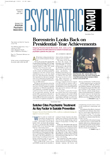While many faculty members and residents agree that residency programs should offer research training, far fewer are actually participating in research, according to a study published in the March issue of Academic Psychiatry.
Mary Jo Fitz-Gerald, M.D., surveyed 399 faculty and resident members of the American Association of Directors of Psychiatric Residency Training (AADPRT) and found that 98 percent of the respondents thought that research training should be offered to residents, but only 42 percent of respondents had actually published research findings.
“Research is not solely the domain of the academician,” said Fitz-Gerald, who said she believes that psychiatrists have the ability to expand the field’s knowledge base. “There is so much that is yet unknown.”
Fitz-Gerald, a residency training director and professor of clinical psychiatry at Louisiana State University Health Sciences Center, conducted the survey to find out the extent to which research is a requirement in residency programs. She also sought to find out whether residents participating in research published their work and believed research was a benefit to their career.
“By doing research, we hope that residents, in particular, can learn to look at problems scientifically and feel that they have an important contribution to make to the field. Also, the research background helps them to look at published reports objectively,” Fitz-Gerald pointed out.
More than 90 percent of those surveyed said that research opportunities were offered to residents in their training program, and 42 percent said that their program had a research requirement. Only 32 percent of respondents, however, thought that research training should be required in residency training.
Many of the AADPRT members had been involved in research: 61 percent had participated in literature reviews, and 44 percent in clinical trials. Fifty-two percent of residents presented their research results at national and regional meetings.
When survey respondents were asked whether they had plans to continue in research, 85 percent of faculty and 64 percent of the residents said yes.
Fitz-Gerald said that one reason that the residents’ percentage wasn’t higher was because residents may be intimidated by the prospect of conducting their own research.
“It isn’t hard to get involved in research if you have someone helping you,” she said. “I think that most residents get involved in research if someone else shows them that it is possible.”
Even an established psychiatrist like Fitz-Gerald relies on help from others. With regard to the Academic Psychiatry report, “I didn’t do it alone. I had my second author help me write the article, and senior staff helped me to make the necessary changes and revisions.”
Another reason is that psychiatric research may not be considered “objective enough.” “More and more research is being undertaken by the pharmaceutical industry, and there is growing concern that it may be biased,” she said.
Fitz-Gerald thinks that faculty mentorship is key to future involvement in research. “I think these findings would encourage residency program directors to find ways to provide research mentorship to residents.”
Research for private practitioners, according to Fitz-Gerald, may be a much less daunting task than people think. To begin with, many private practitioners see a large caseload of interesting patients—the basis for good research, said Fitz-Gerald.
Even an established psychiatrist like Fitz-Gerald relies on help from others. “I didn’t do it alone. I had my second author help me write the article, and senior staff helped me to make the necessary changes and revisions.”
Fitz-Gerald suggested that women physicians who would like to get involved in research contact their professional organization’s office on women.
Information about APA’s Women’s Mentoring Network can be obtained by e-mailing Tara McLoughlin, director of APA’s Office of Career Development and Women’s Programs at [email protected]. Information is also is posted at www.psych.org/women. ▪
